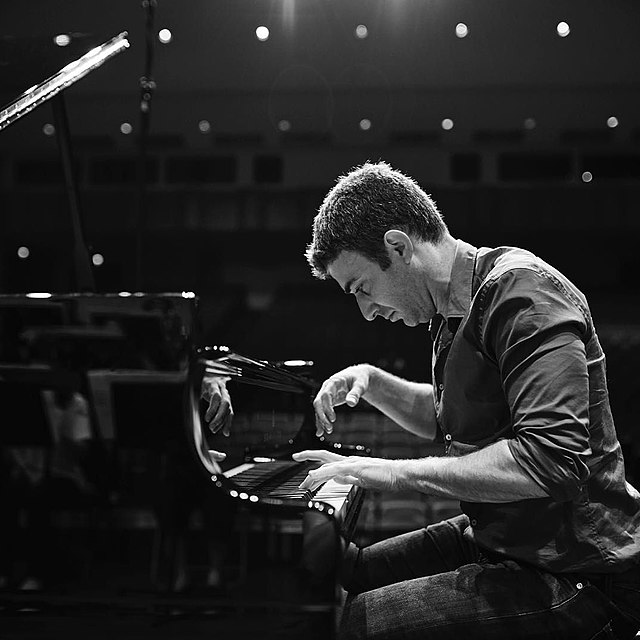by Daniel Hathaway
Today at Noon, Yaron Kohlberg, president of PianoCleveland and second prize winner in the 2007 Cleveland International Piano Competition will play a one-hour concert in the Atrium of the Cleveland Museum of art, and just around the corner, organist Oziah Wales will play J.S. Bach, J.C. Bach, and Johann Pachelbel at the Church of the Covenant (the Covenant recital will also be live streamed).
For details of these and other events, visit our Concert Listings.
NEWS BRIEFS:
Byron Janis, 95. The Hollywood Reporter notes that “Byron Janis, the celebrated classical pianist who studied with Vladimir Horowitz, recorded previously unknown Chopin waltzes from manuscripts he unearthed and became a cultural hero in the U.S. after performing in the Soviet Union during the Cold War, has died.” Read the obituary here.
NEW HENLE PRIZE FOR CIPC
PianoCleveland writes that “G. Henle Verlag, publisher of the world’s most authoritative editions of classical sheet music, has announced it will sponsor an award named the G. Henle Verlag Urtext Prize for the 2024 Cleveland International Piano Competition (CIPC).
Since being founded in 1948, G. Henle Verlag (Henle) has been considered the premier publisher of music in the world, namely with its Urtext editions, which are considered the gold standard for musicians. As a prize sponsor for the CIPC, Henle will award Urtext editions of all piano trios, piano quartets, and piano quintets from their catalog—a prize valued over $4,000.”
TODAY’S ALMANAC:
Departures: Danish-German organist and composer Nicolaus Bruhns died on this date in 1697. Arrivals: Russian impresario Sergei Diaghilev was born on March 19, 1873 in Novgorod, followed exactly one year later by German composer Max Reger in Brand, Bavaria.
Bruhns, who studied with Dietrich Buxtehude and served as organist of the Cathedral of Husum, left a small but distinguished oeuvre of solo organ music (5 pieces) and solo cantatas (12 works) when he died at the age of 31. A violinist as well, he was known for playing that instrument with his hands while his feet were busy on the pedalboard (an effect he wrote into his larger e-minor Präludium, analyzed here by Balint Karosi and violinist Edson Scheid).
CIM graduate David von Behren (now assistant organist and choirmaster at Harvard) channels Bruhns’ feat in several videos. Click here to watch him play his arrangement of the Sinfonia from J.S. Bach’s Cantata 156 in Yale’s Woolsey Hall.
The history of Diaghilev’s Ballets Russes from 1909-1929 is featured in a documentary film. “He persuaded, cajoled, and charmed the greatest talents of the early twentieth century to join his company. Artists (Pablo Picasso and Henri Matisse), composers (Igor Stravinsky and Erik Satie), choreographers (Michel Fokine and George Balanchine), and dancers (Vaslav Nijinsky and Anna Pavlova) all collaborated to realize Diaghilev’s dream of a seamless fusion of the arts.”
Until his death in 1916, Reger enjoyed a distinguished career as composer, pianist, organist, conductor, and teacher. Among his students were Rudolf Serkin and George Szell.
Reger’s organ works combine classical forms with Romantic rhetoric, and his complex scores can be thick with notes.
Follow along with the score to his Variationen und Fuge über ein Originalthema, Op. 73, played by Dutch organist Willem Tanke. The performer describes the work as “A forty minute battle with immense technical difficulties and emotions.”
For another Reger performance, watch Ken Cowan navigate the Phantasie über Wie schön leucht’ uns der Morgenstern, Op. 40 on the Fisk-Rosales organ in Edythe Bates Old Recital Hall at Rice University in Houston.
March 19 saw a number of important first performances, including Joseph Haydn’s The Creation (1799, Vienna), Charles Gounod’s Faust (1859, Paris), Pyotr Tchaikovsky’s Nutcracker Suite (1892, St. Petersburg), Antonín Dvořák’s Cello Concerto (1896, London with Leo Stern), Béla Bartók’s Quartet No. 1 (1910, Budapest, by the Waldbauer Quartet), Alban Berg’s Wozzeck (first American performance, 1931, Philadelphia), Michael Tippett’s A Child of Our Time (1944, London), and John Adams’ The Death of Klinghoffer (1991, Brussels).




